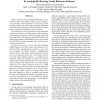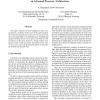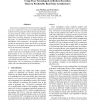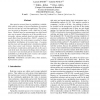101 search results - page 7 / 21 » Realism in Statistical Analysis of Worst Case Execution Time... |
DAC
2003
ACM
14 years 7 months ago
2003
ACM
Schedulability analysis of real-time embedded systems requires worst case timing guarantees of embedded software performance. This involves not only language level program analysi...
RTAS
2005
IEEE
14 years 9 days ago
2005
IEEE
While caches have become invaluable for higher-end architectures due to their ability to hide, in part, the gap between processor speed and memory access times, caches (and partic...
DATE
2000
IEEE
13 years 11 months ago
2000
IEEE
This paper examines several techniques for static timing analysis. In detail, the first part of the paper analyzes the connection of prediction accuracy (worst case execution tim...
RTAS
2008
IEEE
14 years 1 months ago
2008
IEEE
Instruction scratchpads have been previously suggested as a way to reduce the worst case execution time (WCET) of hard real-time programs without introducing the analysis issues p...
ECRTS
2004
IEEE
13 years 10 months ago
2004
IEEE
Most previous research done in probabilistic schedulability analysis assumes a known distribution of execution times for each task of a real-time application. This is however not ...




